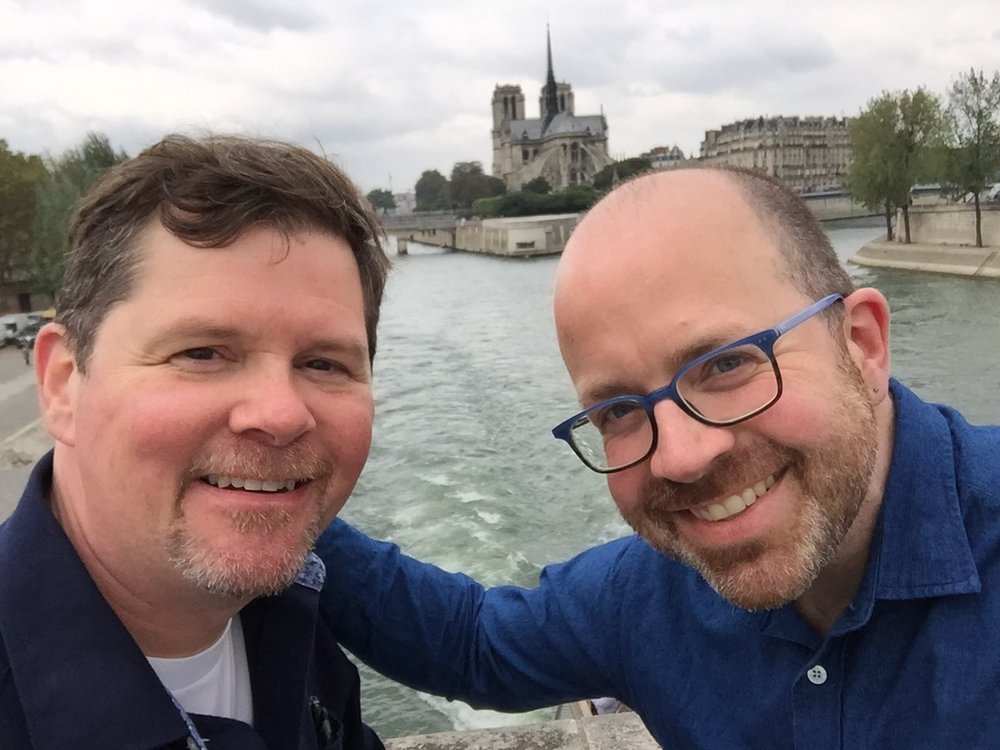Preached on the Feast of the Holy Trinity (Year A), June 4, 2023, at St. Paul’s Episcopal Church, Seattle, Washington by The Reverend Stephen Crippen.
Genesis 1:1-2:4a
Psalm 8
2 Corinthians 13:11-13
Matthew 28:16-20
Our dog Keiko, enjoying a quiet corner of God’s splendid creation.
God creates a vast, blazing array of burning globes that fling themselves eternally outward from God’s first, fierce bang of energy and light. Our light by day is a cheerfully yellow star in the long stride of middle age, and our great night light glimmers with a silver sheen. God invited these lights into being, and they complied.
God creates an astonishing, lush tapestry of trees and flowers, sea creatures and birds in flight, cattle and creeping things. Even the rats that bedevil our office building: even they are part of God’s splendid creation, if a troublesome part. And then, on the same epochal day when God creates the creeping things, God says, “Let us make humankind in our image.” And God proclaims humans and all the creatures of the earth very good.
We humans participate powerfully in God’s splendid creation: we are able to learn and gain insight; we can build things and preserve things; we can look back and plan ahead. As sentient beings, we can be understood as the universe looking at itself: when we contemplate the gorgeous majesty of creation, and when we reflect on our place in that majesty, we are the universe itself becoming conscious, becoming self-aware. And yet, though the psalm today rightly sings of humanity as but little lower than the angels, adorned with glory and honor, nevertheless our reason informs us that this is likely also true about other intelligent species on our planet, and on other planets, too. The universe is too splendid for us to be its only location of self-awareness.
And yet we often fall short of our potential. Even in the proclamation in Genesis that sings beautifully of God creating the heavens and the earth, even there we suffer a failure of imagination. We limit ourselves to narrow descriptions of vast things, particularly when we say, “Male and female he created them.” Humanity is hemmed into two boxes—male and female. And God has he/him pronouns.
But we have moved beyond these constructs! We know better. Just listen to the song of diversity ringing through the creation story of Genesis, chapter one. Seeds of every kind, trees of every kind, swarming sea creatures of every kind, winged birds of every kind, animals of the earth of every kind… And then, *clunk*. Humans are male and female. And God, who creates us, is he/him. In my reading of the Genesis creation song, this is a disappointingly flat lyric. The music suddenly comes to a bumpy stop, even though in the very next bar, God beautifully blesses us and commissions us to care for creation with love and skill.
But I believe the text falling flat just here, in the phrase “male and female he created them,” is a great irony, because the Genesis creation song is working hard even here to show God’s creative diversity, this time in humanity. Humanity is not just “man,” we are “male and female.” We have found vastly more diversity in our species since this was first written, but that’s what they knew then, and they noted the diversity they saw. Or (more likely) they knew more than that, but that’s what they were ready to say out loud, ready to write down. It was a good start. The song of diversity is meant to be edited and expanded.
And God as “he/him”? Well, in a patriarchal, pre-scientific culture, the male of the species was assumed to be the source of creative life. And anyway you heard it yourself: when God describes God’s own self, God uses the plural personal pronouns “us” and “our.” “Let us make humankind in our image.” So God as “he,” even in this primary source, is not what it seems, not the last word on God and gender.
But back to humans as “male and female”: this will disappoint those who shout silly, mean-spirited things like “It’s Adam and Eve, not Adam and Steve,” but we have explicitly transcended the “male/female” construct in our Christian tradition. We Christians have long since moved beyond the male/female binary. In Paul’s letter to the Galatians, he writes, “There is no longer Jew or Greek; there is no longer slave or free; there is no longer male and female, for all of you are one in Christ Jesus.” Notice the conjunction words in that sentence: “Jew or Greek; slave or free;” and then a twist — “male and female…” Not male or female, which would make for clean parallelism in Paul’s writing, but “male and female.” Paul breaks the parallelism because he is directly lifting a portion of the phrase “male and female God created them” directly from Genesis 1. He is transcending the difference claimed there and saying we are all alike, all one. He wants us to catch the Genesis reference.
We can, in turn, transcend the male/female binary in a new direction from Paul, and say we are no longer male and female not because we are all alike, but because we are all different, all along the rainbow, even as we are one. Paul builds on the Torah; we build on Paul; how might our descendants build on us?
Today, in our celebration of God’s splendid creation, we sing of God blessing us and then commissioning us to care for the earth and all creatures, and then we sing of God in Jesus commissioning us to baptize by the power of that same creative, generative Spirit. And finally today we will gather at this Table, which sometimes is rightly called a banquet table at a great wedding, the celebration of the marriage of the Holy Three with all humanity, and with all the whole creation in which humanity is embedded.
When we celebrate the life and work of the Holy Three in creation as a marriage, we are adding a stanza to the Genesis creation song. God does not only bless us, as we hear in stanza six of the song. God goes on to marry us. God first chooses God’s people Israel as God’s own spouse in the story of salvation, freeing them from bondage and raising up prophets, priests, and sovereigns from among them who proclaim the coming of God’s reign of justice and peace over the whole earth. God then keeps God’s own promise to Abraham in Genesis 12, sending God’s people – who now include us – into the world on God’s mission. Now, the image of marriage can be problematic: many – maybe it’s fair to say most – of us are well acquainted with the challenges and vexations of marriage. And always when choosing our metaphors we have to watch out for the pathology of patriarchy. But God marrying humanity in the midst of creation: let’s rest with that for a moment. I think it works. I think it proclaims something true.
The metaphor of course gets a lot of help today as we celebrate and bless the marriage of our siblings in Christ, Howard and Aman. (And of course their union also helps us see how thoroughly our Christian tradition has transcended the old confines of “male and female” in our understanding of human nature and human love.) Today Howard and Aman give us a few bars of music in the marriage stanza of our creation song. God blesses them today, and God blesses their union as another expression of God’s own creative force in a splendid universe.
And then, after asking God’s blessing on Howard and Aman, then we will gather yet again at this Table of Holy Eucharist, where all of God’s wedding guests of all times and places always draw close to us. The Eucharist is a wedding celebration, but it’s not celebrating the union of just one couple. At this Table we sing joyfully about the marriage of all creation with the Holy Spirit of God, who moves through creation at the will of the Creator, and marries us in the Word of God, Jesus Christ. And finally, strengthened by this wedding feast, and married to the Holy Three, we will go from here, flinging ourselves ever outward, like the blazing stars, bearing warmth and light into the splendid creation of God, still groaning for God’s justice, still longing for God’s peace.
Come to the Table, then, and do not delay. Come and see all that God has made. Indeed, it is very good.





